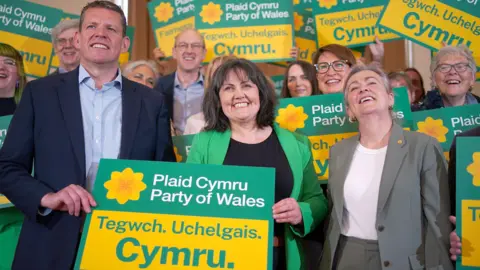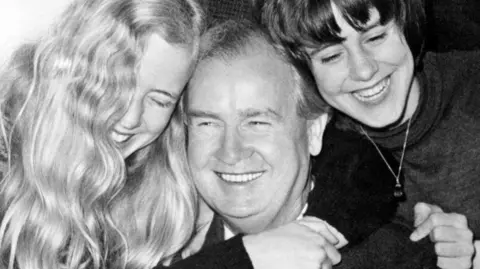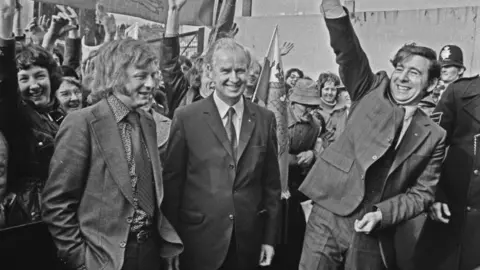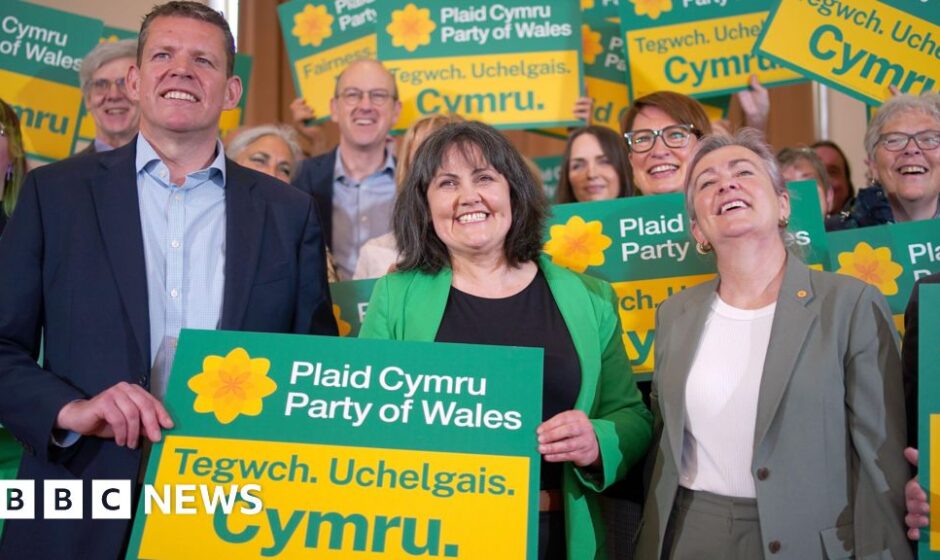Presenter, BBC Radio Wales
 PA Media
PA MediaOn the Maes in Pwllheli, a mobile sign on the pavement advertises a shop’s wares: “Tarot, Crystals, Wicca, Reiki.”
Take a look above the shop window and you will see another sign, a blink-and-you’d-miss-it slate plaque.
In Welsh, it reads: “Plaid Genedlaethol Cymru was established in a meeting here on 5 August, 1925.”
It is an incongruous scene, which belies the political significance of the location.
Six men from two distinct nationalist groups met here a century ago, during the week of the National Eisteddfod in this corner of the Llyn Peninsula, to write a new chapter of Welsh political history.
In day-to-day politics, it is easy to indulge in hyperbole. The dizzying speed of events can distort our judgment as to their true significance.
But take a 100 years of history, and you get a clearer perspective of a party’s impact on the country and its people.
So, what to make of Plaid Cymru, as it reaches its centenary?
“Plaid Cymru has now come to the mainstream of Welsh political life,” said former Plaid MP and assembly member, Cynog Dafis.
To the mind of Elin Jones, the current Llywydd (the Welsh Parliament’s presiding officer) and ex-Plaid Welsh government minister: “The party needs to own its role as the alternative left of centre party of government.”
Leanne Wood, the party’s first female leader, reflects: “What would I put on Plaid Cymru’s report card after 100 years? Good effort, great enthusiasm, could do better.”
Wood’s former university lecturer and Wales’ fourth Labour first minister, Mark Drakeford, adds: “I think Plaid Cymru remains now, in significant parts, a party of protest rather than a party of government.”
While Nick Bourne, former leader of the Welsh Conservatives in Cardiff Bay and, to date, one of the opposition leaders who was closest to securing Plaid the top spot in the Welsh government following the failed coalition negotiations of 2007, said: “I think if one were to ask members of the Welsh public, what do you identify Plaid Cymru with, they’d clearly say independence, the language and the culture.
“Would they identify a single other policy? I’m not sure I could, to be honest.
“So that I think is a challenge for Plaid Cymru,” he added.
 Getty Images
Getty ImagesAt its inception, Plaid was primarily a social movement.
The original six were motivated by the ambition to promote the Welsh language and its culture, as well as securing self-government for Wales.
In which case, Wales has devolution, the number of Welsh speakers is at least stable, and cultural institutions are plentiful.
But is a political party not ultimately judged by its record at the ballot box?
It took more than 40 years since its establishment, until 1966, in the Westminster by-election in Carmarthen, for Plaid Cymru to make its big breakthrough.
“It was an earth-shattering result and it was an epoch-making one as well,” said former Plaid leader Dafydd Wigley.
And yet, Gwynfor Evans lost the seat at the next general election – he would reclaim the constituency in a subsequent vote.
Despite the odd good result – the first Welsh Assembly election in 1999 in particular – it has been a patchy and often poor electoral record. The self-described “Party of Wales” has fallen way behind Labour and struggling to register in many parts of Wales.
The locations of the two Eisteddfods that currently bookend Plaid’s history – Pwllheli in 1925, and this week’s gathering in Wrexham where the party will celebrate its centenary – illustrate the point.
It took until 1974 for Plaid Cymru to first represent the Pwllheli area in Westminster, but it is now right in the heart of the party’s electoral fortress on the western coast.
Wrexham, on the other hand, has never come close to electing a Plaid MP or Senedd member.
The party has never won a Wales-wide election, and never has there been a Plaid first minister.
And yet, there has been this constant tension within the party as to Plaid’s true purpose – is it to be the agent that changes Wales or does it pressure Labour to move in the same direction?
Back in 2021, Plaid Cymru, having come third in that year’s Senedd election, signed a co-operation agreement with the Welsh Labour government to ensure some of its policies would see the light of day.
 Getty Images
Getty ImagesSpeaking on the steps of the Senedd following the announcement of the deal, the then Plaid leader, Adam Price, said: “To us in Plaid Cymru, Plaid isn’t the most important word – Wales comes first for us every time.”
Nine months away from the next electoral test and with Rhun ap Iorwerth, a new leader at the helm, the party has a different ambition.
Wigley himself admits he wasn’t ready to lead in 1999, so far Plaid’s best Cardiff Bay election result: “We’d done our work as an opposition party and had a platform for government, but we just hadn’t got all the ducks in a row, as it were.”
With 2026 in sight, Plaid now has its eyes very much set on the top spot and, if some opinion polls are to be believed, it could genuinely happen.
Next year’s Senedd election, with a new voting system more reflective of votes cast, is shaping up to be the most fascinating since the start of devolution
Can Labour keep the party’s Rolls Royce campaigning operation purring to maintain its grip on power? Is Reform UK about to steal the show and shake up the established order?
Or is it Plaid Cymru’s time?
That chapter of history is yet to be written.
#years #Plaid #Cymru #verge #leading #Wales



